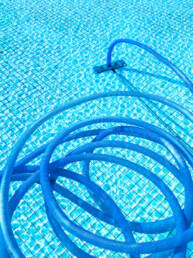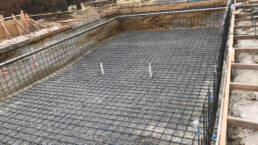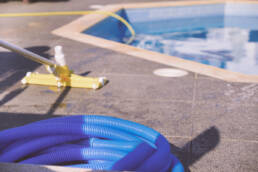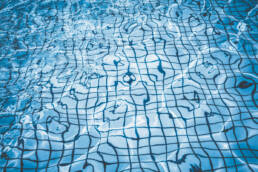As winter sets in, pool owners in Denver, CO, face unique challenges in maintaining their pools. Laguna Pools understands the importance of proper winter pool care to ensure your oasis is ready for the next swim season. In this blog, we’ll explore five crucial tips for winter pool maintenance tailored to the Denver climate.
Invest in a High-Quality Pool Cover
Winter in Denver can be unforgiving, with snow, ice, and plummeting temperatures. Protecting your pool from the harsh elements is paramount for its longevity. Laguna Pools emphasizes the importance of investing in a top-tier, durable pool cover designed to withstand the specific challenges of Denver’s winter climate.
Choose a cover that not only fits snugly over your pool but also offers robust protection against debris, snow, and ice infiltration. A securely fitted cover acts as a shield, preventing any unwanted elements from compromising the water quality and the pool structure. Additionally, Laguna Pools highlights the energy-saving benefits of a well-fitted cover, as it helps retain heat within the pool. This not only ensures a more comfortable swimming experience when the weather warms up but also contributes to reduced energy costs for heating.
To further enhance the effectiveness of your pool cover, Laguna Pools recommends periodic inspections throughout the winter. Ensure that the cover remains intact, free from tears or damage, and make any necessary adjustments to maintain its protective integrity.
Balance Chemical Levels
While it may be tempting to neglect chemical maintenance during the winter, Laguna Pools underscores the importance of maintaining proper chemical levels throughout the colder months. Regular testing and adjustments to the pool’s pH, alkalinity, and chlorine levels are critical components of winter pool care.
Denver’s winter conditions can create an environment conducive to algae growth, even in the lower temperatures. Laguna Pools advises pool owners to stay vigilant by testing and balancing chemical levels, as this not only prevents algae but also safeguards pool equipment from corrosion. Seeking guidance from a pool professional is recommended, especially when considering winter-specific chemical adjustments. A professional can provide insights into the unique chemical requirements of winter pool maintenance, ensuring that your pool remains in optimal condition during the colder months.
By prioritizing these chemical maintenance practices, pool owners can rest assured that their pool water will stay crystal clear, and the pool equipment will be protected against potential damage, setting the stage for a seamless transition into the next swimming season.
Winterize Pool Equipment
Denver’s winter cold poses a potential threat to your pool equipment if not handled properly. Recognizing this, Laguna Pools strongly recommends the crucial step of winterizing your pool equipment to ensure its longevity and optimal functioning come spring.
To start, draining water from pipes, filters, and pumps is paramount in preventing freezing. Water left within these components can expand when it freezes, causing irreparable damage. Laguna Pools advises pool owners to meticulously drain each component, leaving no room for winter’s icy grip to wreak havoc. Additionally, disconnecting hoses and ensuring that no residual water remains in the system is essential to avoid potential cracks and ruptures.
Moreover, store removable components, such as skimmers and heaters, indoors during the winter months. This protective measure shields these elements from the extreme cold, extending their lifespan and maintaining their efficiency. Store these items in a dry, temperature-controlled environment to prevent any damage caused by freezing temperatures.
By taking the time to winterize your pool equipment properly, you’re not only safeguarding against potential damage but also ensuring a smooth and trouble-free start to the next swimming season. This proactive approach to winter maintenance aligns with Laguna Pools’ commitment to helping you enjoy your pool year after year.
Monitor Water Level
As snow blankets the landscape and rainfall becomes part of the winter norm, your pool’s water level can fluctuate. Laguna Pools advises vigilant monitoring and timely adjustments to maintain a balanced water level throughout the winter.
If the water level drops too low, it can lead to serious consequences, including damage to the pool’s surface and equipment. Low water levels can expose the pool liner and potentially cause cracking. To counteract this, regularly check the water level and add water as needed to maintain the optimal level for your pool.
Conversely, excessive water accumulation from melted snow or heavy rainfall can pose a different set of challenges. Laguna Pools recommends draining excess water to prevent overflowing, which can compromise the pool’s structural integrity and lead to potential damage.
By keeping a close eye on your pool’s water level and making necessary adjustments, you contribute to the overall health and longevity of your pool. This simple yet crucial step ensures that your pool remains in top condition, ready to welcome you back for a refreshing swim when the winter chill finally gives way to warmer days.
Regular Inspections and Professional Services
Winter may seem like a time when your pool is in hibernation, but Laguna Pools emphasizes the importance of ongoing vigilance. Even during the colder months, conducting regular inspections of your pool is essential to catch any potential issues before they escalate.
Begin by visually inspecting the pool area for signs of damage, such as cracks in the pool’s structure or any abnormalities in the surrounding deck or coping. Pay close attention to the pool’s water level and color, as changes could indicate underlying problems. Inspecting for leaks is crucial during winter, as these can lead to substantial water loss and potential damage.
Laguna Pools recommends a thorough examination of the pool equipment, ensuring that covers are secure, and there are no visible signs of wear or damage. Check for loose or damaged fittings, and inspect the condition of electrical components to guarantee safe operation. Addressing these issues promptly can prevent more significant problems and costly repairs in the future.
In addition to self-inspections, consider scheduling professional pool maintenance services during the winter months. A qualified technician can provide a comprehensive assessment of your pool’s condition, perform necessary winterization tasks, and address any potential problems with expertise. Professional services can include checking and adjusting chemical levels, inspecting and winterizing pool equipment, and ensuring that all components are functioning optimally.
By combining regular self-inspections with professional services, you’re taking a proactive approach to winter pool maintenance. This ensures that your pool remains in top-notch condition, ready to offer a seamless and stress-free transition into the next swimming season.
**Conclusion:**
In conclusion, proper winter pool maintenance in Denver is not just a seasonal obligation but a year-round commitment to preserving the longevity of your pool. Following the five tips provided by Laguna Pools – investing in a high-quality pool cover, balancing chemical levels, winterizing pool equipment, monitoring water levels, and conducting regular inspections – will collectively contribute to a hassle-free pool opening in the spring.
Laguna Pools encourages pool owners to be proactive in safeguarding their investment and maximizing the enjoyment of their pool during the warmer months. Remember, a well-maintained pool in winter translates to a stress-free summer by the water’s edge. By adhering to these guidelines, you’re not just maintaining a pool – you’re creating a haven that stands the test of time.

Ready for an expert opinion? Get in touch today!
Laguna Pools is a professional pool and spa contractor that has been servicing the Denver area for over 20 years. We offer routine cleaning and maintenance services, new pool design, construction, and remodeling.
Like this article? Spread the word!
Related Posts
June 19, 2024
Dive into Excellence: Discovering Laguna Pools in Denver
Discover Laguna Pools in Denver, your premier choice for expert pool maintenance and…
May 17, 2024
Get Your Pool Ready for Summer with Laguna Pools
Get your Denver pool summer-ready with Laguna Pools! Our expert guide covers cleaning,…
April 23, 2024
Dive In: Top Five Reasons to Use Laguna Pools for Your Denver Area Pool Maintenance
Discover the top five reasons to choose Laguna Pools for your Denver area pool…





